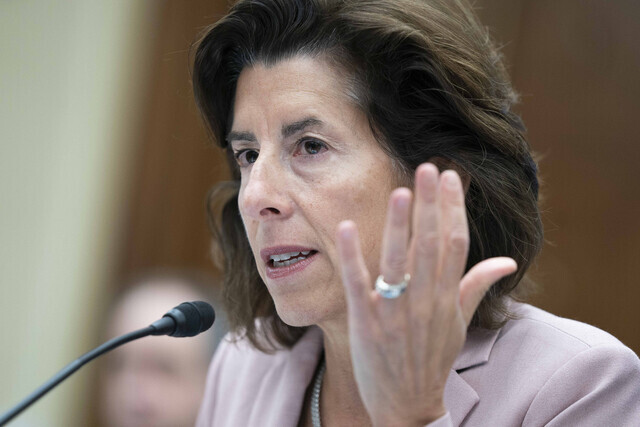The government and industry figures have requested specifics on the proposed regulations, expressing concerns about the broad scope of connected vehicle tech

US Commerce Secretary Gina Raimondo. (UPI/Yonhap)
As the US moves to regulate Chinese-manufactured connected cars, the South Korean automotive industry is scrambling to determine the scope of the new controls. A connected car refers to a vehicle that’s equipped with virtually any internet-related services. Because its broad scope does not make it easy to rule out every and all parts manufactured in China, the South Korean government and domestic industry have submitted opinions to the US government asking for a more precise delimitation of the regulations.
On Wednesday, US Commerce Secretary Gina Raimondo told Reuters in an interview that the US could take “extreme action, which is to say no Chinese connected vehicles in the United States or look for mitigation.” The statement suggests that connected vehicles utilizing Chinese technology and parts could soon be banned in the US.
This move demonstrates that the US is going beyond the checks on Chinese-made batteries and electric vehicles laid out in the Inflation Reduction Act and is reviewing trade policies to curb the growth of Chinese-made smart cars.
The South Korean automotive industry is expressing concern over the scope of US regulations, as connected cars can broadly refer to automobiles that use any kind of information technology.
Real-time navigation through smartphone applications and in-car infotainment systems, as well as remote start-up, are basic functions in connected cars, with over-the-air updates to vehicle maintenance software being another feature. Most of these functions are available to car owners by subscribing to a particular company’s service and downloading a smartphone app.
As of March 2023, there were 7.08 million vehicles in Korea using connected car features, accounting for 27.5% of the total number of registered vehicles (25.75 million).
This explains concerns that a good portion of recently released vehicles could be subject to regulations.
“The concept of connected cars is so broad and includes many different features, but if regulations state that no Chinese-made technology and parts can be included, we’ll be unable to use small parts like bolts,” one official in the South Korean automotive industry stated. “This means that most cars will be subject to US export regulations.”
The point is that, much like the IRA’s ban on critical minerals and battery components processed or manufactured in China, the restrictions lack specificity in scope.
The South Korean government and related industries hurried to express their opinions to the US government.
On April 30, the government wrote to the US Department of Commerce, calling the definition and scope of connected cars “excessively broad,” as it encompasses all kinds of vehicles that have recently entered the market and asking the US to provide a “precise definition” of the scope of connected vehicles.
Hyundai Motor Group and the Korea Association of Automobile & Mobility Association also sent an opinion noting that connected vehicles are made up of a variety of components, including wires and bolts, and asking that the US limit its regulations on connected car technology to specific hardware and software.
The US intends to decide on the level of regulation after amassing opinions and conducting surveys.
By Jun Seul-gi, staff reporter
Please direct questions or comments to [[email protected]]

